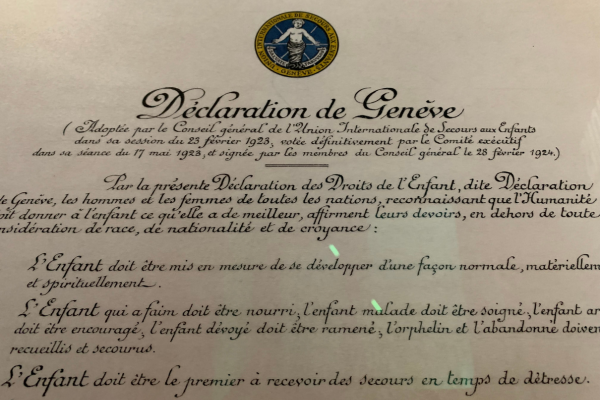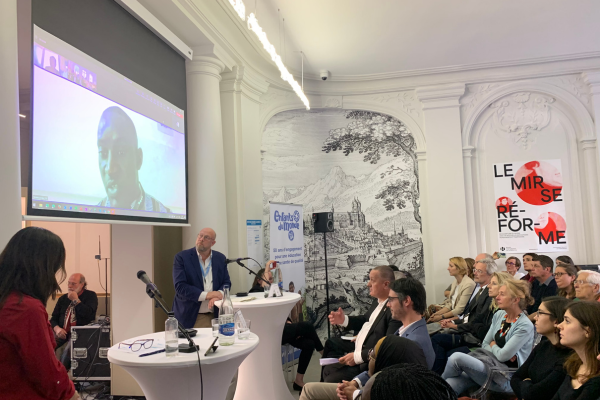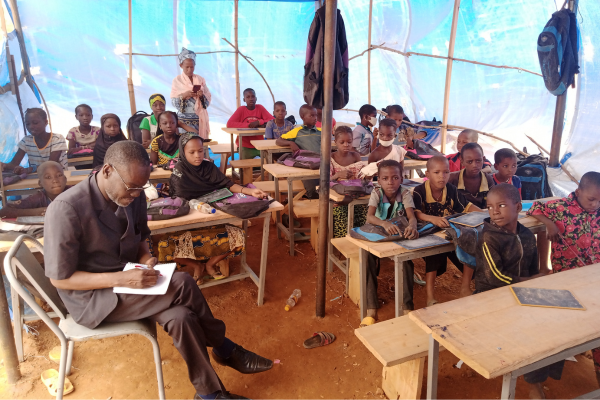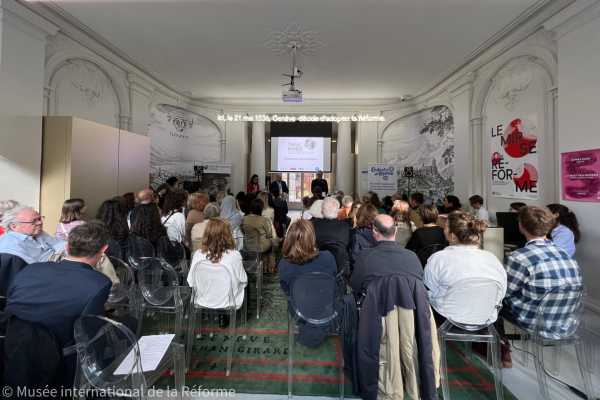The Declaration of the Rights of the Child (Declaration of Geneva) celebrates its 100th anniversary!
On this occasion, the Musée International de la Réforme (MIR) in Geneva is hosting the original Declaration and the "Déflagrations" exhibition of children's drawings, and organized a round-table discussion on the situation of children in times of conflict with the UN Committee on the Rights of the Child, Terre des Hommes Suisse, Save the Children and our association on May 10.

Children in armed conflict: the situation worsens
There are conflicts we hear a lot about: Ukraine, Syria, Afghanistan... and others that are less in the media spotlight, such as the security crisis in Burkina Faso or the gang war in Haiti.
Whatever the war, conflict or crisis, children have always been among the first victims of violence. In 2021, around 449 million children - one in six worldwide - were living in a conflict zone. The situation did not improve in 2022, with a high number of serious violations of children's rights: recruitment and use of children in military operations, murders, mutilations, abductions, sexual violence...
Shedding light on what has been done and what remains to be done: specialists speak out
At the round table on May 10, almost 100 guests listened attentively as a panel of specialists debated the rights of children in times of conflict. They denounced the lack of respect for children's rights despite a clear international legal framework, and deplored the fact that even today, children are still victims of the cruelty of war.
See a short video of the May 10 round table (in French).
We were there alongside Médecins Sans Frontières, Save the Children and Terre des Hommes Suisse to discuss our different actions in favor of children in conflict situations. The emotion was palpable as we heard the testimonies of our field workers.
Representatives of the United Nations Committee on the Rights of the Child spoke of a complex and painful situation, highlighting the work carried out by various international players on the ground to date, and also highlighting the efforts that still need to be made.

Children victims of war have a right to an education: the example of Burkina Faso
Our colleague Simané Ouoba, in charge of educational projects in emergency situation and protection, spoke by videoconference from Burkina Faso.
Enfants du Monde has been working in Burkina Faso for over thirty years. We have gradually witnessed the deterioration of security in the country and its terrible consequences for children. Armed groups are imposing widespread insecurity, leading to massive population displacement. Schools are directly targeted by attacks. Millions of children are deprived of an education.
That's why we're running an emergency education project that enables thousands of children to benefit from quality education.

Simané explained how we offer accelerated learning programs for children who have missed many months of school due to violence, the supplies we distribute to the most vulnerable (bicycles to get to school, solar lamps to do homework even without electricity)... We train teachers in psycho-social support for children. We also train them in active pedagogy to ensure that the children participate effectively despite the large number of pupils (up to 200 per class!). We also work with communities to assess and prevent dangers, and thus protect children.
In "red" zones that are now difficult to access, we broadcast educational radio programs and distribute radios to families so that children can continue their education from a distance.

A multifaceted issue
The round-table discussion between specialists was moderated by Beata Godenzi, our General Secretary, and Philip Jaffé, member of the United Nations Committee on the Rights of the Child. Gabriel de Montmollin, Director of MIR, introduced the evening.
Opening the evening, Daniel Palmieri, ICRC historian, explained the genesis of the Geneva Declaration, which for the first time recognized specific rights for children. Today, there is a Convention on the Rights of the Child, which is legally binding for states: Mikiko Otani, former president of the Committee on the Rights of the Child, opened the discussion and reiterated her concern about the continuing serious violations of children's rights in conflict zones.
In addition to the field testimony of our colleague Simané from Burkina Faso, Guerty Aimé, coordinator of Terre des Hommes Suisse in Haiti, gave a very concrete report on the situation of children involved in gang wars.
Michel Anglade, Director of Save the Children in Geneva, recalled that it was the organization's founder, Eglantyne Jebb, who created the Declaration of the Rights of the Child in 1923.
Marcos Moyano, mental health advisor at the Médecins Sans Frontières operations center, explained the impact of conflict on children's mental health.
The "Déflagrations" exhibition, featuring drawings by children confronted with war, can be seen at the Musée de la Réforme until August 27. Don't hesitate to visit it to better understand why the issue of children's rights in armed conflict is more important than ever today.
